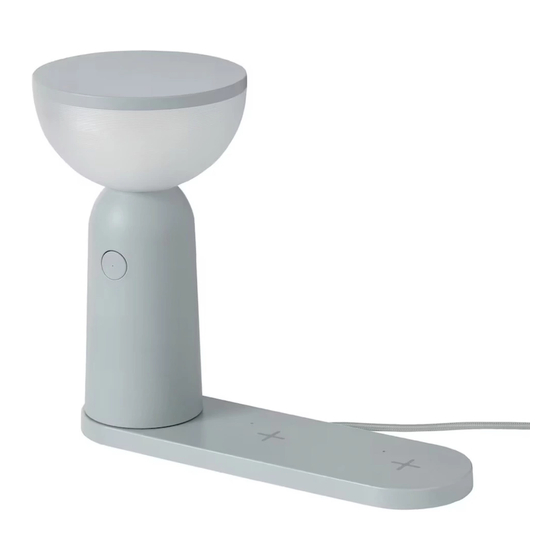- ページ 5
照明器具 IKEA BETTORPのPDF マニュアルをオンラインで閲覧またはダウンロードできます。IKEA BETTORP 12 ページ。
IKEA BETTORP にも: マニュアル (12 ページ), マニュアル (12 ページ), マニュアル (24 ページ), マニュアル (28 ページ), クイック・スタート・マニュアル (12 ページ)

Recommended battery types:
4 x IKEA LADDA 2450 (AA/HR6, 1.2V,
2450mAh, Ni-MH) (not included).
Use only Ni-MH type batteries.
Do not use Alkaline, Carbon Zink or
other similar battery types.
Do not mix batteries of different
capacities, types or date stamps.
Remove the batteries if the product is to
be stored for a long time or before it is
scrapped.
Product servicing
Do not attempt to repair this product
yourself. If you open or remove parts,
you may expose yourself to dangerous
voltage points or other risks.
Technical data
Type: E2022 BETTORP
Input: 5.0V DC/4 x 1.2V AA/HR6 Ni-MH
Estimated charging time: 4-5 h
Estimated battery time:
6 h at 100% brightness
Brightness: 150lm/60lm/18lm
Indoor use only
Manufacturer: IKEA of Sweden AB
Address:
Box 702, SE-343 81 Älmhult, SWEDEN
The 'Qi' symbol is a trademark of the
Wireless Power Consortium
This device complies with Part 15 of
the FCC Rules.
This device contains licence-exempt
transmitter(s)/receiver(s) that comply
with Innovation Science and Economic
Development Canada's licence-exempt
RSS standard(s).
Operation is subject to the following
two conditions:
(1) this device may not cause harmful
interference, and
(2) this device must accept any
interference received, including
interference that may cause
undesired operation of the device.
WARNING:
Any changes or modifications to this
unit not expressly approved by the
party responsible for compliance could
void the user's authority to operate the
equipment.
NOTE:
This equipment has been tested and
found to comply with the limits for
a Class B digital device, pursuant to
part 15 of the FCC Rules. These limits
are designed to provide reasonable
protection against harmful interference
in a residential installation.
This equipment generates, uses and
can radiate radio frequency energy
and, if not installed and used in
accordance with the instructions, may
cause harmful interference to radio
communications. However, there is
no guarantee that interference will
not occur in a particular installation.
5
